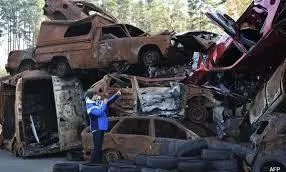
War tourism thrives in Ukraine amid ongoing conflict
text_fieldsSpanish traveler Alberto Blasco Ventas recently visited Ukraine's war-torn Irpin bridge, a symbol of resistance against the Russian invasion.
The destroyed bridge, once crucial to Kyiv’s defense, is now a focal point for "dark tourism," a niche but growing industry attracting thrill-seekers from around the globe.
Blasco Ventas, a 23-year-old software engineer, admitted to feeling nervous during his first visit to a war zone. Despite his family’s concerns, he documented his journey, which involved a flight to Moldova and an 18-hour train ride to Kyiv, for his YouTube channel. Known for exploring extreme locations, Blasco Ventas defended his actions as respectful and aimed at raising awareness.
War Tours, a Ukrainian company offering such experiences, has catered to about 30 tourists this year, primarily from Europe and the U.S. Tour packages range from €150 to €250, with a portion of the profits donated to the Ukrainian army. Co-founder Dmytro Nykyforov emphasized that the tours are less about profit and more about preserving the memory of the war.
Tourism company Capital Tours Kyiv echoed this sentiment, likening the visits to a "vaccine" against future conflicts. Tours often include locations around Kyiv and its suburbs, such as Bucha and Irpin, which were sites of alleged Russian atrocities in early 2022. Some companies even offer multi-day tours closer to the front lines in southern Ukraine, priced as high as €3,300.
Local residents, however, have mixed feelings. Ruslan Savchuk, an Irpin resident, questioned the appeal of living under constant threat. "A drone recently fell 300 meters from my house. I wouldn’t wish this experience on anyone," he said, though he acknowledged the potential economic benefits of tourism.
The rise of war tourism has sparked debates about its morality. Mykhailyna Skoryk-Shkarivska, a local councillor in Irpin, noted that while many locals accept the industry, some view the profits as "blood money." The head of Ukraine's National Agency for Tourism Development, Mariana Oleskiv, acknowledged the ethical challenges but said the sector’s growth is inevitable.
Ukraine is also preparing for a post-war tourism boom, having signed agreements with Airbnb and TripAdvisor. Despite the ongoing conflict, the tourism sector is showing resilience, with revenues this year surpassing those of 2021. Domestic tourism, driven by men restricted from leaving the country due to martial law, is a key contributor.
Oleskiv expressed hope for Ukraine’s future. "War has brought global attention to our country. Now, everyone knows about Ukraine."






















